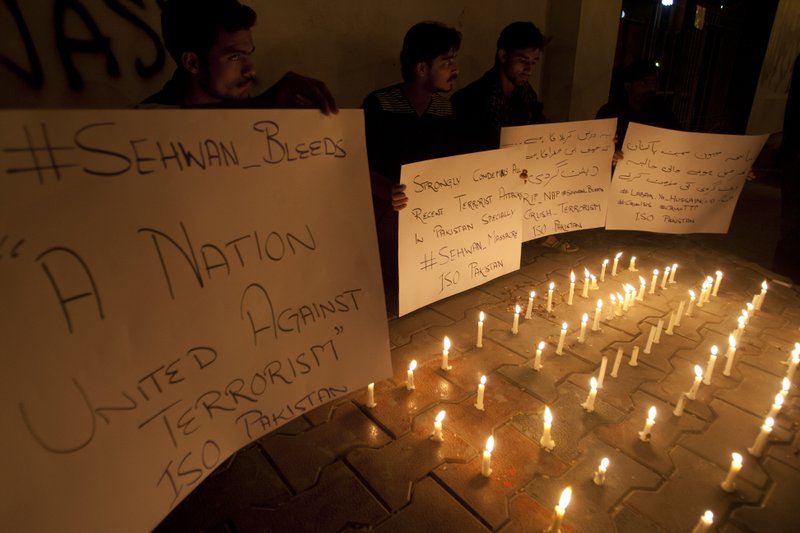ISLAMABAD -- An attack on a Sufi shrine that killed 88 people raised fears that the Islamic State extremist group has become emboldened in Pakistan, aided by an army of homegrown militants benefiting from hideouts in neighboring Afghanistan, analysts and officials said Friday.
RELATED ARTICLE
http://www.arkansas…">Attack in Iraq kills militia 8
Pakistani security forces have carried out sweeping countrywide raids after Thursday's bombing of the shrine in Pakistan's southern Sindh province that also wounded 343 people. The military's public relations wing reported on its official Twitter account that more than 100 suspected "terrorists" were killed in the raids, while government officials lashed out at Kabul, accusing the Afghan government of ignoring earlier pleas to crack down on militant hideouts.
Thursday's terror attack -- Pakistan's deadliest in years -- stunned the nation and raised questions about the authorities' ability to rein in militant groups despite several military offensives targeting militant hideouts.
It also threatened to drive a deeper wedge between Pakistan and Afghanistan. Islamabad quickly lashed out at Kabul, saying the bombing was masterminded in militant sanctuaries across the border in Afghanistan, whose own security forces have been assaulted by Islamic State fighters. Overnight Thursday, Afghan authorities said 17 Afghan soldiers were killed by Islamic State insurgents.
Pakistan's Army chief Gen. Qamar Javed Bajwa spoke by phone with U.S. Gen John Nicholson, the top U.S. commander in Afghanistan, to protest militant sanctuaries on Afghan soil, according to a statement carried on the military's official Twitter account. Bajwa said the Afghan government was not taking action against the hideouts and warned that its "inaction" was testing "our current policy of cross-border restraint," without further elaborating.
Pakistan fired blistering rounds of artillery shells into Afghan territory Friday and shut down the Torkham border crossing -- a key commercial artery between the two neighbors. Pakistan said the barrage was in response to a militant attack on one of its border posts in its Khyber tribal region.
Pakistan TV, quoting unnamed military sources, said Pakistan targeted camps belonging to Jamaat-ul-Ahrar, a breakaway faction of the Pakistani Taliban. Pakistan blames Jammat-ul Ahrar for the shrine attack although the Islamic State claimed responsibility. Jamaat-ul-Ahrar has claimed to have carried out a number of attacks, including Monday's suicide assault in Lahore that killed 13 people, including three senior police officials.
According to local TV reports the Pakistani shelling destroyed one militant camp in Afghanistan.
Afghan officials said scores of families have been displaced by the Pakistani shelling. Attaullah Khogyani, the spokesman for Afghanistan's eastern Nangarhar provincial governor, said he welcomed any operation, including the one carried out by Pakistan, against terrorist camps but said "on a provincial level there wasn't any kind of coordination with us."
In a telephone call Friday to Afghanistan's national security adviser, Pakistan's senior foreign ministry official, Sartj Aziz, accused Afghan President Ashraf Ghani of ignoring Islamabad's earlier request to put an end to the sanctuaries in its territory.
Pakistan's military did not specify who was on the list, but it has long claimed that the head of the Pakistani Taliban, Mullah Fazlullah, and other militants are hiding on Afghan soil with the purpose of fomenting violence inside Pakistan.
Ghani, meanwhile, condemned the shrine attack.
"Terrorists once again proved that they have no respect for Islamic values," he said in a statement.
In Thursday's attack, the suicide bomber walked into the main hall at the Lal Shahbaz Qalandar shrine in Sehwan in southern Sindh province, and detonated his explosives among a crowd of attendees.
The Islamic State, claiming responsibility for the attack in a statement circulated by its Aamaq news agency, said it targeted a "Shiite gathering." The Sunni extremist group views Shiites as apostates and has targeted Pakistan's Shiite minority in the past.
The Sehwan shrine, which reveres a Muslim Sufi mystic, is frequented by the faithful of many sects of Islam but the majority of the faithful attendees are usually Shiite Muslims.
Information for this article was contributed by Munir Ahmed, Zarar Khan, Jawad Adil and Amir Shah of The Associated Press.
A Section on 02/18/2017


